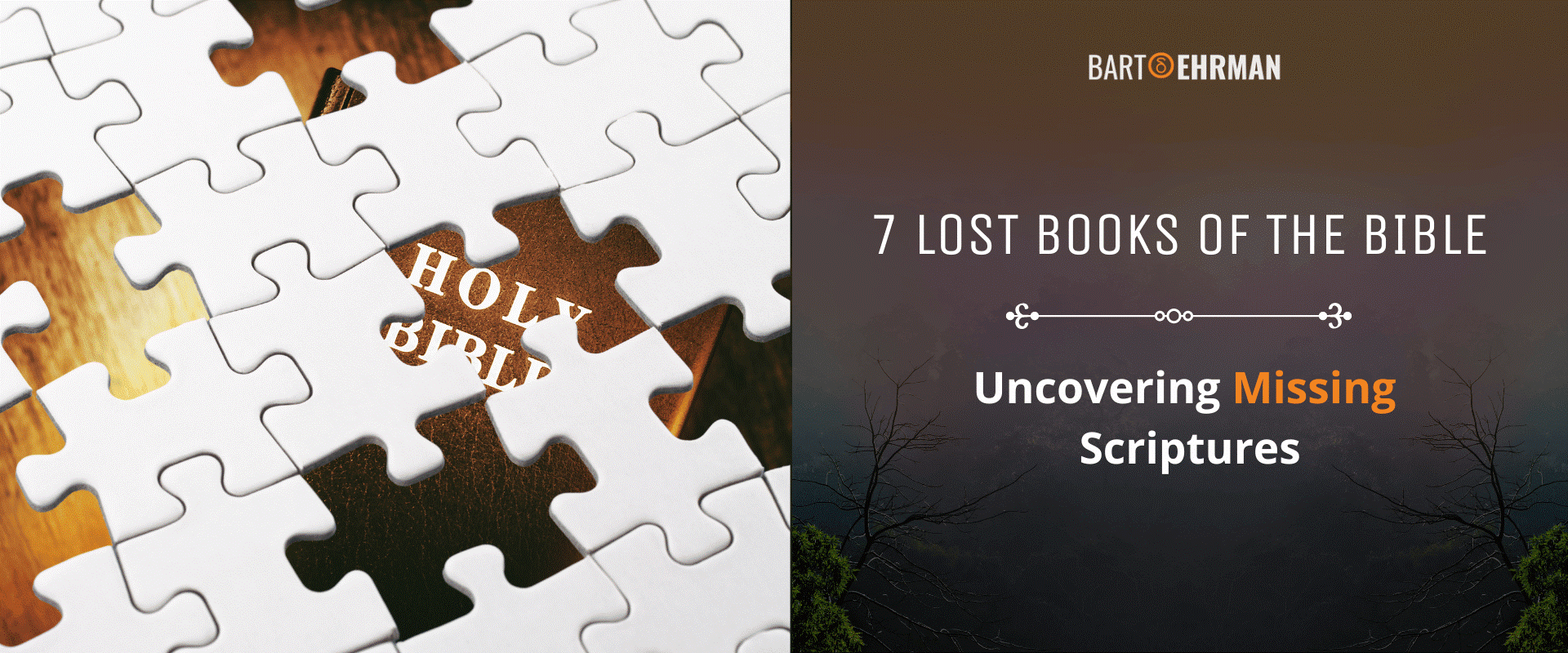7 Lost Books of the Bible: Uncovering Missing Scriptures

Written by Marko Marina, Ph.D.
Author | Historian
Author | Historian | BE Contributor
Verified! See our guidelines
Verified! See our editorial guidelines
Date written: September 10th, 2024
Edited by Laura Robinson, Ph.D.
Disclaimer: The views and opinions expressed in this article belong to the author and do not necessarily match my own. - Dr. Bart D. Ehrman
It's nearly impossible to comprehend the magnitude of cultural loss that accompanied the burning of the great Library of Alexandria. This legendary repository was believed to contain hundreds of thousands of scrolls — some estimates suggest over half a million — spanning a vast array of subjects.
From groundbreaking scientific treatises and philosophical discourses to historical records and literary masterpieces, the destruction of these works marked an irreversible blow to the intellectual heritage of the ancient world. The story of the lost books of the Bible echoes this sense of profound loss.
While the Library of Alexandria is a symbol of cultural devastation, missing books of the Bible represent another type of absence — one that stirs both scholarly curiosity and public intrigue.
These are the books that were once considered sacred, or at least important enough to be mentioned by ancient authors. But, over time, they disappeared, leaving only tantalizing hints in other writings or whispers in historical records.
What makes these lost books particularly compelling is the mystery they embody. Were they omitted deliberately due to theological differences? Were they simply forgotten or suppressed by early church authorities? Or did they perish in the countless upheavals and transitions that marked the early centuries of Christianity?
In this article, we’ll delve into the enigmatic world of these missing scriptures, exploring not only the Old Testament Apocrypha and non-canonical texts of the New Testament but also those truly lost books referenced by early Christian writers yet never recovered.
Article Guide:
By doing so, we hope to shed light on the broader question of how the Bible we know today was shaped, and what might have been lost along the way.
Before we begin, I want to invite you to join Bart D. Ehrman’s excellent course titled “In the Beginning: History, Legend, and Myth in Genesis”. In it, Dr. Ehrman provides a scholarly analysis of Genesis, answering difficult questions on intriguing and important stories such as the 7-day creation and the Flood."

The Old Testament Apocrypha: Not Lost, but “Forgotten”
When Christianity first emerged, it didn’t have its own set of scriptures. Instead, early Christians adopted the sacred texts of Judaism as their Bible. Furthermore, most early Christians were Greek-speaking, so they turned to a Greek translation of the Hebrew Scriptures known as the Septuagint.
This collection included not only the familiar books originally written in Hebrew, such as Genesis and Exodus but also additional books written in Greek, including 1 and 2 Maccabees. The Both Jewish and Christian communities widely used the Septuagint, though it was never officially standardized.
Around 200 CE, Jewish leaders made the significant decision to formally define their canon of Scripture, choosing to include only those texts that were originally written in Hebrew.
This move came as Christians were beginning to solidify their own New Testament canon. However, unlike their Jewish counterparts, Christians continued to accept the Greek-written Jewish books as part of their Old Testament.
It wasn't until the Protestant Reformation in the 16th century that reformers such as Martin Luther and John Calvin argued that Christians should also limit their Old Testament to the Hebrew texts, excluding the Greek additions. This led to the division between what Protestants and Catholics consider canonical.
In The Old Testament Apocrypha: An Introduction, Otto Kaiser explains Luther's views:
(Affiliate Disclaimer: We may earn commissions on products you purchase through this page at no additional cost to you. Thank you for supporting our site!)
“Luther judged the Apocrypha not to be of equal value with the other books of Holy Scripture and, therefore, excluded them from the canon. They appeared in his 1534 and 1545 editions of the Bible as an appendix under the heading “Apocrypha: These are books, although not considered Holy Scripture, which are nonetheless useful and good to read.”
The books that were excluded from the Protestant Old Testament became known as the Apocrypha. Though they aren’t strictly speaking “lost books of the Bible,” they have been relegated to a secondary status in some Christian traditions where they became known as the books not included in the Bible.
Some of the Old Testament Apocrypha books include:
For those interested in a deeper exploration of the Apocrypha, we recommend two of our earlier articles. One provides a detailed definition and history of the term “Apocrypha”, while the other focuses on the authorship of these fascinating yet often overlooked books.
Books Not Included in the Bible: What Didn’t Make the Cut?
The formation of the New Testament was neither a quick nor straightforward process. It was a prolonged journey marked by heated debates and controversies that stretched across centuries. During the first 400 years of Christianity, different Christian communities championed various collections of books as their Sacred Scripture.
Many of these collections contained texts that are familiar to us today, such as the Gospels and the letters of St. Paul, but they often also contained other writings. It wasn’t until 367 C.E. that a definitive list of the twenty-seven books we know today as the New Testament was proposed.
This list was first presented by Athanasius, the influential bishop of Alexandria, in a letter to the churches under his jurisdiction.
Even so, this didn’t immediately put an end to the debates. Christians in different regions continued to accept other books as canonical for some time. Over the next few centuries, however, Athanasius’ list gradually became the nearly universal standard within Christendom.
What drove the closure of the New Testament canon? Contrary to what my students — who sometimes seem more influenced by the infamous “Da Vinci Code” than by historical facts — like to believe, it wasn’t a power play by Emperor Constantine. The truth is far less dramatic and, dare I say, much more boring.
The process of canonization began long before Constantine was in the picture. The “proto-orthodox” Church was more concerned with (theological) orthodoxy than imperial politics, and their task was to sift through a diverse range of texts to determine which ones truly reflected the teachings of Jesus and the apostles.
The criteria they used were rigorous: a book had to be ancient, apostolic, catholic, and orthodox.
As Bart Ehrman aptly explains in his book Truth and Fiction in the Da Vinci Code, the criteria were clear:
“A sacred authority had to date back to near the time of Jesus... An authority had to be written by an apostle—or at least by a companion of the apostles... Books had to have widespread acceptance among established churches to be accepted into the canon. In other words, they had to be 'catholic,' the Greek term for 'universal'... Far and away the most important criterion, though, had to do with the nature of the views outlined in a book. To some extent, in fact, the other criteria were handmaidens to this one. For if a book was not orthodox, it was obviously not apostolic, ancient, or catholic.”
With these criteria in mind, many early Christian writings were left out of the New Testament canon. Some of these have gained notoriety in modern times, especially because they offer alternative perspectives on the life of Jesus or the teachings of the apostles.
To get a first-hand insight, check out an anthology of up-to-date and readable translations of the books removed from the Bible in Bart D. Ehrman’s “Lost Scriptures”. It’s an amazing opportunity to read for yourself these often-forgotten but important early Christian voices!
Did You Know?
The Mystery of the Secret Gospel of Mark: Ancient Text or Modern Hoax
One of the most intriguing and controversial discoveries in biblical scholarship is the so-called “Secret Gospel of Mark.” In 1958, a scholar named Morton Smith claimed to have found a previously unknown letter attributed to Clement of Alexandria while researching at the Mar Saba monastery near Jerusalem.
This letter included excerpts from what was purported to be a secret, longer version of the Gospel of Mark, containing passages that suggest a more esoteric understanding of Jesus’ teachings. However, the controversy didn't end with the content of the text.
Almost immediately after Smith published his findings, scholars began to debate whether the Secret Gospel of Mark was a genuine ancient text or a modern forgery. Some have accused Smith himself of creating the document as an elaborate hoax by pointing to inconsistencies and the lack of independent verification. Whether authentic or not, the Secret Gospel of Mark continues to captivate and perplex scholars!
While these non-canonical books aren’t considered part of the Bible, they aren’t the only “lost” texts of early Christianity.
As it turns out, there are other writings mentioned by early church fathers that have not survived at all — these are the truly lost books of the Bible. In the next section, we’ll explore these mysterious texts and their potential significance.
7 Missing Books of the Bible: Once Written, Never Discovered
What books are missing from the Bible? In a broad sense, many of the books we've discussed so far fall into that category.
However, these texts were never part of the Bible in the first place; rather, they were excluded from the canon for various reasons and under different historical circumstances. Their absence is the result of deliberate decisions made by early church leaders as they sought to define the boundaries of their Sacred Scripture.
But beyond these well-known non-canonical books, other texts are truly lost to history — books that could have, under different circumstances, been part of the Bible but vanished without a trace. These are the writings we know about only through references in other ancient works.
In other words, they didn’t survive the ravages of time, and despite our best efforts, they remain elusive, undiscovered, and out of reach.
It’s important to emphasize that while these lost books of the Bible could have potentially been included in the Sacred Scripture of Christianity, that outcome was by no means inevitable. The formation of the Biblical canon was a complex process shaped by countless factors and criteria.
Had history taken a different turn, some of these lost writings might have found a place within the pages of the Bible we know today. Yet, the reality is that they did not. Their absence speaks to the many different paths that history could have taken, and how the Bible, as we know it, could have been different.
#1 - Lost Books of the Bible: The Real 1 Corinthians
Yes, your eyes aren’t playing tricks on you — there really is a letter that Paul wrote to the Corinthians before the one we know as 1 Corinthians in the New Testament. This earlier letter, often referred to as the “Real 1 Corinthians” is lost to history, mentioned only in passing by Paul himself (1 Cor 5:9).
While we may never know the full content of this letter, the context in which Paul refers to it gives us some intriguing clues.
Paul mentions this lost letter within a discussion of a serious issue plaguing the Corinthian church: sexual immorality. Specifically, he uses the Greek term “porneia”, which broadly refers to various forms of sexual misconduct. In the particular case, he highlights, Paul is addressing a scandal involving a man living with his father’s wife — an act considered shocking even by the standards of the broader Greco-Roman world.
To understand the historical context of this scandal, we can turn to Joseph A. Fitzmyer's Commentary on 1 Corinthians, where he writes:
“The scandal has been made by a specific case of ‘sexual immorality’, viz., a man living with his father’s wife. He is annoyed that the Corinthian Christian church has tolerated such a situation in its midst. Paul is not reacting so much against what the individual Corinthian Christian has done as against the image that the Corinthian community is projecting of itself... The specific case, however, is only one aspect, serious though it may be, of the condition in which the Corinthian community finds itself, because Paul realizes that it has been tolerating in its midst many other immoral persons.”
Given this context, we can hypothesize that Paul’s lost letter likely addressed similar issues of moral and communal discipline. It’s possible that he warned the Corinthians about the dangers of allowing such behavior to go unchecked.
Moreover, Paul may have urged them to distance themselves from the immoral practices prevalent, stressing that their witness as Christians depended on living lives that reflected their faith.
Although the “Real 1 Corinthians” hasn’t survived, its absence leaves us with questions about what Paul might have written in his early correspondence with the Corinthians. This letter, as one of the lost books of the Bible, is a reminder of the complex and often messy realities of the early Christian communities.
#2 - Epistle to the Laodiceans
The New Testament “Epistle to the Colossians” mentions a letter that Paul supposedly wrote to the church in Laodicea, a city in Asia Minor (4:16). Unfortunately, like many other early Christian writings, this text hasn’t survived the ravages of time.
To make matters even murkier, scholars continue to debate whether Paul actually wrote Colossians, which casts some doubt on the accuracy of this reference. So, was there really a letter to the Laodiceans, or is this just another biblical mystery? The answer, as usual, isn’t straightforward.
Adding another layer to the intrigue, the Muratorian fragment, the oldest surviving list of canonical books from the late 2nd century, does mention an Epistle to the Laodiceans. However, it doesn’t do so kindly. Instead, it warns readers that this letter is a Marcionite forgery — a counterfeit text associated with the teachings of Marcion.
But if that wasn’t complicated enough, there’s yet another letter to the Laodiceans that has survived, this time in several Latin manuscripts. This version, however, lacks any of the distinctive features of Marcion’s theology, leaving scholars doubting it’s the same text mentioned in the Muratorian fragment.
So, where does that leave us? It seems that we might be dealing with at least two different epistles to the Laodiceans:
One thing is clear, though: neither of these letters was written by the apostle Paul. In other words, both are likely later forgeries — an all-too-common phenomenon in the early Christian world, as Bart D. Ehrman discusses extensively in his book Forgery and Counterforgery.
Consequently, the work that the author of Colossians refers to as Paul’s epistle to the Laodiceans remains elusive, still hidden in the annals of history. This makes it yet another candidate for the category of the lost books of the Bible, leaving us to wonder what other secrets this lost letter (if it ever existed) might have contained.
#3 - Paul's Earlier Letter to the Ephesians: Missing Book or Fiction?
In Ephesians 3:1-4, we find a curious reference that suggests the existence of an earlier letter from Paul to the Ephesians. The passage reads:
“For this reason I, Paul, the prisoner of Christ Jesus for the sake of you Gentiles — Surely you have heard about the administration of God’s grace that was given to me for you, that is, the mystery made known to me by revelation, as I have already written briefly. In reading this, then, you will be able to understand my insight into the mystery of Christ.”
This intriguing mention of a prior communication has led some to wonder if Paul wrote another letter to the Ephesians that has since been lost to history. However, much of this speculation hinges on whether Paul actually penned Ephesians in the first place.
Many scholars question Paul's authorship of Ephesians due to differences in writing style, vocabulary, and theology compared to his undisputed letters, such as Romans and Galatians.
One potential indicator that Ephesians might be a later forgery is the extent to which the author goes to persuade readers that he is, indeed, the apostle Paul. As Bart D. Ehrman notes in Forgery and Counterforgery:
“At the same time, one of the other striking features of the book is the lengths to which the author goes in order to make the letter sound like Paul’s — in fact, to insist to his readers that he really is Paul... The structure of the letter is, for the most part, Pauline (with the one key exception mentioned above) and it uses dozens of ‘Pauline sounding’ words, phrases, and ideas. Apart from that, the author makes an inordinate number of self-references.”
These self-references include statements like the one in Ephesians 3:3, where the author speaks of a mystery that had been “made known to me by revelation, as I have already written briefly.”
If this reference to a previous letter is merely a rhetorical device — akin to the method of verisimilitude — used by the author to bolster the claim of being Paul, then there may never have been an earlier and genuine Pauline epistle to the Ephesians.
However, if this mention does refer to an actual previous letter, we are once again faced with the prospect of one of the missing books of the Bible. Unfortunately, in this case, we are left with little to no clues about its possible content.
#4 - The Book of the Wars of the Lord
Now, let's shift our focus back to the Old Testament period, where we encounter another intriguing yet elusive text: “The Book of the Wars of the Lord”. This mysterious work is mentioned briefly in the Bible, specifically in Numbers 21:14, where it’s cited as a source for a poetic account of Israel’s journey through the wilderness.
What we can infer from its title is that this work probably chronicled battles Israelites fought in their early history. In his Commentary on Numbers John Sturdy explains: “It was no doubt a collection of songs celebrating the victories of Israel over its enemies. We know of a similar book called the Book of Jashar which recorded David’s lament for Saul and Jonathan.”
Unfortunately, like many other ancient writings, this book has been lost to history, which leaves us with only enticing hints of what it might have contained.
As one of the missing books of the Bible, its absence underscores the gaps in our understanding of Israel's early experiences and how they interpreted their relationship with God through the lens of warfare.

#5 - The Acts of Solomon: A Lost Chronicle of a Legendary King
Continuing our journey through the Old Testament period, we come across another intriguing yet vanished text: The Acts of Solomon. This work is mentioned briefly in 1 Kings 11:41, which states: “As for the other events of Solomon’s reign — all he did and the wisdom he displayed — are they not written in the book of the acts of Solomon?"
What we can surmise from the title is that The Acts of Solomon likely detailed the reign of King Solomon, one of Israel’s most renowned monarchs. This text may have chronicled his political achievements, such as the construction of the Temple in Jerusalem or other feats that we aren’t aware of at all.
Whatever its particular content was, this work certainly represents, as Alice L. Laffey notes, a source where more information could be found regarding Solomon’s reign. It’s a shame that The Acts of Solomon didn’t survive!
#6 - The Book of the Chronicles of the Kings of Israel and Judah: A Lost Record of Two Kingdoms
Another intriguing but missing book of the Bible! It’s mentioned throughout the OT books of Kings and Chronicles as a source for additional details on the reigns of Israel's and Judah's monarchs. For example, 1 Kings 14:19 states: “As for the other events of Jeroboam’s reign, how he warred and how he ruled, are they not written in the book of the chronicles of the kings of Israel?”
Given its title and the context in which it’s cited, The Book of the Chronicles of the Kings of Israel and Judah likely served as an official record of the deeds, policies, and significant events during the reigns of various kings in the northern kingdom of Israel and the southern kingdom of Judah (10th-6th centuries).
#7 - The Gospel of Matthias: A Lost Account from a “Lesser-Known” Apostle
We are now turning again to the New Testament period to wrap up our exploration into the missing books of the Bible. One of the more enigmatic texts from this era is The Gospel of Matthias. Mentioned by early Church authors, this gospel is associated with Matthias, the apostle chosen to replace Judas Iscariot after he betrayed Jesus.
What can we infer about The Gospel of Matthias? Early church fathers such as Origen and Eusebius mentioned this text, indicating that it was known in some early Christian communities. Clement of Alexandria even quotes a verse from it, emphasizing the importance of both faith and knowledge.
However, like many other non-canonical gospels, it may have offered a perspective on Jesus' teachings or events from his life that differed from the accounts we have in the canonical Gospels.
In his Ecclesiastical History, Eusebius labeled it as a heretical fabrication:
“We have felt compelled to give this catalog so that we might be able to know both these works and those that are cited by the heretics under the name of the apostles, including, for instance, such books as the Gospels of Peter, of Thomas, of Matthias, or any others besides them, and the Acts of Andrew and John and the other apostles, which no one belonging to the succession of ecclesiastical writers has deemed worthy of mention in his writings.”
If Eusebius is correct, The Gospel of Matthias would never have made it into the New Testament canon. However, if its content had been less controversial and early Christian history had taken a different course, it might have been read during church services even today.
Yet, as with so many other lost books of the Bible, we are left with only speculation, as this gospel ultimately faded into obscurity.
As we near the finish line of our exploration, I want to invite you to dive deeper into this fascinating topic with the excellent book The Lost Books of the Bible and the Forgotten Books of Eden. This resource offers readable translations and valuable information on both the books not included in the Bible and those elusive missing books of the Bible.
Conclusion
The journey through the lost books of the Bible reveals the complex and often unpredictable nature of early religious history. These texts, whether referenced in the Old or New Testament, provide tantalizing glimpses into the beliefs, practices, and debates that shaped the development of both Judaism and Christianity.
Yet, just as the burning of the Library of Alexandria robbed the ancient world of its intellectual treasures, the loss of these biblical texts leaves us with unanswered questions and a sense of what might have been.
While we may never recover these writings, their absence continues to spark curiosity and scholarly inquiry.
Who knows? Perhaps if history had taken a different turn, these lost books would be as familiar to us today as the scrolls that perished in the flames of Alexandria. One can only imagine the discussions in theology classes — and the extra reading assignments — that might have ensued!
FREE COURSE!
WHY I AM NOT A CHRISTIAN
Raw, honest, and enlightening. Bart's story of why he deconverted from the Christian faith.
Over 6,000 enrolled!

